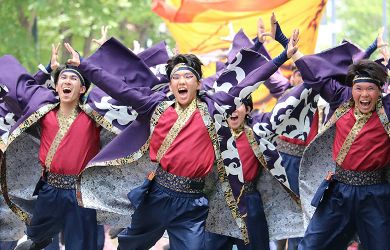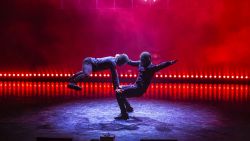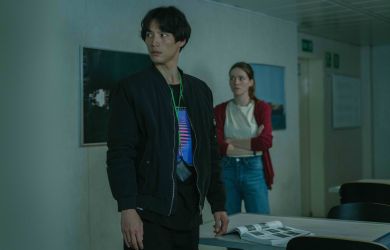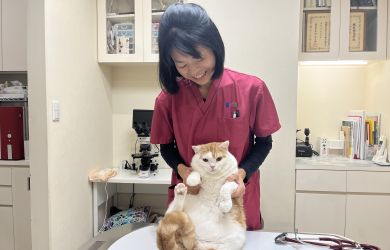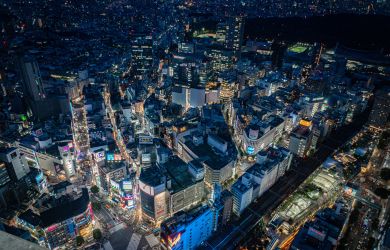
October 15, 2009
Mariko Takeda
Chin up, shoulders back: Metropolis books a date with one of Tokyo’s top posture gurus
By Metropolis
Originally published on metropolis.co.jp on October 2009

Photos Courtesy of Style Urban
If I was about to interview a rock star, I wouldn’t be this nervous. Instead, I’m scheduled to meet Mariko Takeda, a “posture consultant” whose wisdom and enviable alignment have graced a number of magazines, including Vogue Nippon. The 37-year-old Nagano native is actually remarkably down-to-earth and makes me feel at ease—despite the pressure to sit up straight for the next 60 minutes.
While an hour of posture training may sound dry, Takeda’s approach is to teach correct deportment through dance exercises. “This way, students can feel like they are learning an additional skill at the same time,” she explains At the core of her instruction is what she calls the “Golden Steps”: alignment adjustment, stretching to improve flexibility, and training to strengthen overlooked muscles. In practice, however, this could entail a ballet drill to correct form or a belly dancing exercise to build up core muscles.
Takeda herself trained as a professional dancer at the prestigious OSK Performing Arts School. She credits ballet, which she started at the age of three, for her own enviable posture. This was a quality she took for granted until the experience of participating in the Miss Shonan beauty pageant changed her perspective.
“All of the other contestants were so attractive,” she recalls, “but as they walked across the stage to give their self introductions, I noticed how many of them had bad posture. It really took away from their good looks.” Takeda effectively demonstrates her point by mimicking the common faults—sloped shoulders, protruding bum, splayed knees. Though insisting she was “hardly the best-looking girl,” she took home the grand prize, attributing the victory to her better-than-average deportment.
Winning the contest brought with it a number of opportunities, and Takeda spent her 20s employed as a model, race queen, tarento and actress. It was only after a personal and professional setback left her despondent for two years that she returned to her original training.
“Taking a deep breath and straightening your posture can reset your body and your outlook,” she says, explaining how she managed to draw inspiration for her next move. To help give young girls a similar perspective and advantage, she opened a children’s ballet school in her hometown. Five years later, she still commutes to Nagano every weekend to teach.
Her next project was Style Urban, which she opened four years ago across the street from what was to become Tokyo Midtown. The small yet stylish studio space affords students personal attention, and has proved popular with busy career women in their 20s to 40s. The newly revised schedule reflects Takeda’s current interest in community building: Monday through Thursday evenings feature a rotating schedule of dance-themed lessons by different instructors, including belly dance, tango, salsa and Takeda’s own “Body-make Ballet” class (members ¥3,000, drop-ins ¥3,500). Fridays, meanwhile, are reserved for special events, such as guest instructors, performances or parties that Takeda hopes will create a kinship among her students.

For those who want to get the most out of their time, she also offers private “Shisei Bijin” (posture beauty) lessons during the day, starting at ¥10,000/hour. This course begins with a “posture check”—a photo taken against a grid backdrop that illustrates crooked shoulders and out-of-line hips all too clearly—followed by an hour of training tailored to the student’s unique weak points and goals. At the end of the session, the check is repeated, often showing marked improvement.
Of course, making good posture a habit is another challenge entirely, and Takeda recommends a minimum of ten lessons, private or group, to ensure lasting adjustments. All of her classes come with homework assignments, such as stretches and exercises that can be easily completed in front of the TV, at your desk, or on the train. It is a gradual process, she explains.
“After the first lesson students usually tell me they feel good. Over time, however, they report feeling lighter and less tired in general.”
And should you need extra help overcoming tiredness, Style Urban also has an oxygen capsule—just for good measure.
2F 7-3-13 Roppongi, Minato-ku. Tel: 03-3408-2332. Open Mon-Sat noon-10pm, appointment necessary (some Japanese ability required). Nearest stn: Nogizaka or Roppongi. Map. Directions. www.styleurban.com


